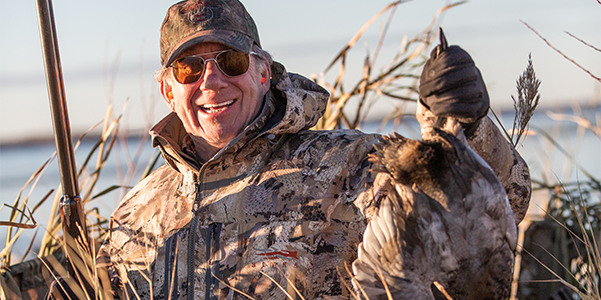John Childs

Private equity manager John Childs strives to find successful formulas - both in finance and waterfowl conservation.
The Florida businessman and avid conservationist points to Delta Waterfowl's Million Duck Campaign as the most pragmatic and promising solution to ensure that North America's duck populations remain strong long into the future. It's the main reason why he's one of the major contributors to MDC.
"It's the best way I have seen of addressing breeding duck productivity," Childs said. "Nest success on unmanaged fields is simply too low in many areas of the prairie. Delta's MDC is the first organized way of taking Predator Management and applying it broadly enough to have a significant impact on the population of ducks. It's the first program focused on improving the productivity of our duck habitat, and that's worth supporting."
In 2022, Delta launched MDC, a transformative $250 million fundraising campaign to add 1 million ducks to the fall flight annually, forever. Delta will achieve the organization's goal by increasing the number of Hen House nesting structures on key breeding areas and increasing the scope of Predator Management. In addition, MDC will bolster Delta's Habitat Conservation, Research and Education, and HunteR3 pillar programs.
Childs grew up hunting Virginia's Back Bay and North Carolina's Currituck Sound with his father. Both areas were magnets for wintering canvasbacks. For Childs, seeing great flocks of the regal "king of ducks" wing past the duck blind ignited a passion for waterfowl and waterfowl hunting.
"I started duck hunting at an early age, and I loved it," he said. "Now, I like to support groups that support my passions."
Childs has a long history of waterfowl conservation philanthropy, including a stint as president of the Wetlands America Trust. He became involved with Delta Waterfowl in 2014 to support canvasback research on the breeding grounds in Canada.
"I'm very concerned about the population of canvasbacks, so I've been funding research on them at Minnedosa (Delta's field research station in southwest Manitoba) for the past nine years," Childs said. "We're getting signals that it's helping. I'm willing to fund science. My support is about saving the species so the world will go on enjoying as many ducks as we have today."
When the historic Delta Marsh property once owned and developed by Delta founding father James Ford Bell came up for sale, Childs was immediately interested. He purchased the 400-acre property and York Lodge in 2018, which sits in the middle of Delta's 3,600-acre legacy property at the south end of Lake Manitoba. Childs has since facilitated major habitat improvements to his acreage for breeding and staging ducks, while also allowing key access to the marsh for waterfowl research purposes.
In addition, Childs joined Delta's Board of Directors in 2020 and served as a key member of the group that helped formulate and launch MDC.
The ideal scenario to produce ducks in an environment of increased land development and agriculture is to save the best habitat in the prairie pothole region through conservation easements and then turn Delta Waterfowl loose to increase the productivity.
"That would make a nice little duck machine," Childs said. "I was a big proponent of Delta's Predator Management trapping and Hen House models long before they became the Million Duck Campaign. Acquiring land is a rear-guard action, because you can't acquire it fast enough to offset the drainage, development, and everything else that's happening to it. So, you need to learn how to use the land you have more productively or you're going to see a continual decline in the number of ducks. Putting Delta's science and programs to work is how we can use good habitat more productively."
While he is impressed with all members of Delta's Duck Production and leadership team, Childs credits president and chief scientist Dr. Frank Rohwer as a key reason for his support of MDC.
"One reason this campaign appeals to me is because I'm very impressed with the science, dedication, and energy of Frank Rohwer," Childs said. "He deserves a lot of credit for having the vision and having populated that vision with solid science to make the Million Duck Campaign a reality."
Delta certainly cannot conduct leading waterfowl research and scale up duck production to an impactful level without the support of major donors who understand and fund conservation. Leadership on the level provided by donors such as Childs is critical to Delta's mission to produce ducks and ensure the future of waterfowl hunting.
"Very few people have been as important for waterfowl conservation as John Childs," Rohwer said. "He's a current-day James Ford Bell. Childs is just a fantastic conservationist who focuses his incredible generosity on the breeding grounds and duck production. He's one of the key drivers of the Million Duck Campaign." -Paul Wait



